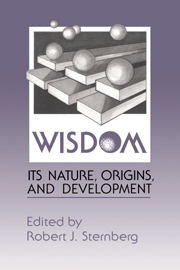Book contents
- Frontmatter
- Contents
- List of contributors
- Preface
- Part I Approaches to the study of wisdom
- Part II Approaches informed by philosophical conceptions of wisdom
- Part III Approaches informed by folk conceptions of wisdom
- 5 Toward a psychology of wisdom and its ontogenesis
- 6 Wisdom in a postapocalyptic age
- 7 Wisdom and its relations to intelligence and creativity
- 8 The study of wise persons: integrating a personality perspective
- Part IV Approaches informed by psychodevelopmental conceptions of wisdom
- Part V Integration of approaches and viewpoints
- Name index
- Subject index
7 - Wisdom and its relations to intelligence and creativity
Published online by Cambridge University Press: 05 June 2012
- Frontmatter
- Contents
- List of contributors
- Preface
- Part I Approaches to the study of wisdom
- Part II Approaches informed by philosophical conceptions of wisdom
- Part III Approaches informed by folk conceptions of wisdom
- 5 Toward a psychology of wisdom and its ontogenesis
- 6 Wisdom in a postapocalyptic age
- 7 Wisdom and its relations to intelligence and creativity
- 8 The study of wise persons: integrating a personality perspective
- Part IV Approaches informed by psychodevelopmental conceptions of wisdom
- Part V Integration of approaches and viewpoints
- Name index
- Subject index
Summary
When we think of Solomon, we think of him as having been wise. Einstein we remember as intelligent, and Milton as creative. What makes one man wise, another intelligent, and a third creative? Clearly, any one of these men might be remembered for any of these three attributes. Certainly Solomon's solution to the problem of how to determine the true mother of a child was intelligent and creative as well as wise. Einstein's formulation of the theory of relativity bore extraordinary elements of creativity and elements of wisdom as well as of intelligence. And Milton's Paradise Lost shows prodigious intelligence and wisdom as well as creativity. Yet, we remember each of these great men for a different attribute. Much as the attributes may overlap, they also seem to have distinctive characteristics that set them apart.
The goal of this chapter is to formulate a theory of wisdom that specifies its common as well as its distinctive attributes with respect to intelligence and creativity. To accomplish this goal, I will draw on two approaches to the study of wisdom: use of implicit theories and use of explicit theories. What, exactly, constitutes an implicit or an explicit theory?
Implicit theories are constructions by people that reside in the minds of these people. They thus constitute people's folk psychology. Such theories need to be discovered rather than invented because they already exist, in some form, in people's heads.
- Type
- Chapter
- Information
- WisdomIts Nature, Origins, and Development, pp. 142 - 159Publisher: Cambridge University PressPrint publication year: 1990
- 84
- Cited by



